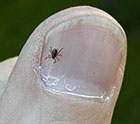Warmer spring temperatures in the northeastern U.S. are leading to shifts in the emergence of ticks that carry Lyme
 disease, and milder weather is allowing ticks to spread into new geographic regions, according to findings published this week. The data — which span 19 years and include observations of more than 447,000 ticks — show that the insects emerged nearly three weeks earlier in warmer years. And when fall temperatures were mild, a smaller percentage of larval ticks entered dormancy and waited until spring to feed, the study found. “Here in the Northeast, warming is already having an effect, and people need to be tick-vigilant before May, as potentially infected nymphal ticks are searching for their blood meals earlier and earlier,” said co-author Richard S. Ostfeld, an ecologist at the Cary Institute.
disease, and milder weather is allowing ticks to spread into new geographic regions, according to findings published this week. The data — which span 19 years and include observations of more than 447,000 ticks — show that the insects emerged nearly three weeks earlier in warmer years. And when fall temperatures were mild, a smaller percentage of larval ticks entered dormancy and waited until spring to feed, the study found. “Here in the Northeast, warming is already having an effect, and people need to be tick-vigilant before May, as potentially infected nymphal ticks are searching for their blood meals earlier and earlier,” said co-author Richard S. Ostfeld, an ecologist at the Cary Institute.

Adult blacklegged tick